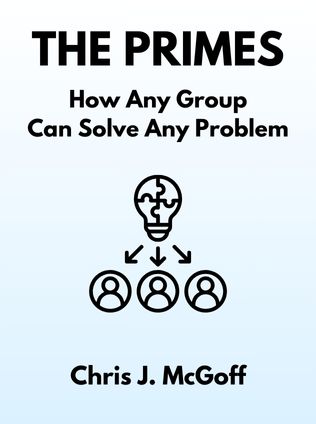
The Primes
How Any Group Can Solve Any Problem
By Chris J. McGoff
Published 01/2011
About the Author
Chris J. McGoff is the founder of The Clearing, Inc., a management consulting firm based in Washington, D.C. McGoff has dedicated his career to helping organizations tackle complex problems and achieve transformative results. His approach focuses on identifying universal patterns in group behavior, known as PRIMES, and using these patterns to guide groups towards effective collaboration and problem-solving. With a wealth of experience in consulting and leadership, McGoff has become a trusted advisor to numerous organizations seeking to navigate uncertainty and drive change.
Main Idea
The central premise of "The PRIMES: How Any Group Can Solve Any Problem" is that there are universal, inextricable patterns of behavior that emerge whenever people come together to solve problems, drive change, and transform systems. McGoff argues that by mastering these patterns, known as PRIMES, leaders can significantly enhance their ability to lead groups and achieve extraordinary outcomes, even in the most complex and uncertain environments. The book provides a comprehensive guide to understanding these patterns and leveraging them to foster effective collaboration and problem-solving.
Table of Contents
- Universal Patterns of Leading in Uncertain Times
- Universal Patterns of Powerful Alliances
- Universal Patterns of Outstanding Group Performance
- Universal Patterns of Group Failure
- Universal Patterns of Thriving in Ambiguity
Universal Patterns of Leading in Uncertain Times
In the first part of the book, McGoff discusses how some individuals and organizations thrive in uncertain times while others falter. The key, he suggests, lies in understanding and leveraging the PRIMES to lead effectively.
Being Clear on What's Really Important
McGoff emphasizes the importance of clarity in leadership. He defines leading as setting direction, allocating resources, and inspiring action. These three elements are crucial for effective leadership, and any time spent outside these activities is not truly leading.
"Take a moment to highlight the times over the last five days when you were setting direction, aligning resources, and inspiring action." - Chris J. McGoff
Leaders must distinguish between managing and leading. Managing involves making the business more efficient, while leading is about inspiring and directing the organization towards its goals. Clarity on these roles helps leaders focus on what truly matters.
Change Versus Transformation
McGoff differentiates between change and transformation. Change involves making improvements to the current system, whereas transformation requires a complete overhaul to create an entirely new system. This distinction is critical for leaders to understand, as it dictates the approach they should take to solve problems.
"Transformation involves a break with the past that is traumatic but potentially freeing." - Chris J. McGoff
Change is suitable for simple problems where incremental improvements are sufficient. Transformation, on the other hand, is necessary for complex, "wicked" problems that require a fundamental shift in how things are done. Leaders must recognize which approach is needed to address the challenges they face.
Being Intentional and Going First
Leaders must be intentional about their actions and willing to take the first step. Commitment and integrity are fundamental in this process. McGoff defines integrity as doing what you say you will do, every time. This builds trust and enables higher performance.
"Integrity is not based on values or morals. It is based on honoring and keeping your word." - Chris J. McGoff
Being intentional means having a clear vision and being committed to achieving it. Leaders must lead by example, demonstrating integrity in all their actions. This sets the tone for the rest of the organization and fosters a culture of accountability and trust.
Enrolling Others
Effective leaders know how to enroll others to achieve a common goal. This involves creating a sense of shared purpose and commitment among team members. McGoff explains that teams are not always feasible, and leaders must often work with coalitions of diverse stakeholders.
Sign up for FREE and get access to 1,400+ books summaries.
You May Also Like
The Subtle Art of Not Giving a F*ck
A Counterintuitive Approach to Living a Good Life
By Mark MansonRich Dad Poor Dad
What the Rich Teach Their Kids About Money - That the Poor and Middle Class Do Not!
By Robert T. KiyosakiHow To Win Friends and Influence People
The All-Time Classic Manual Of People Skills
By Dale CarnegieQuiet: The Power of Introverts
The Power of Introverts in a World That Can't Stop Talking
By Susan Cain



















